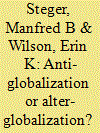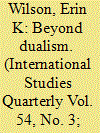| Srl | Item |
| 1 |
ID:
118153


|
|
|
|
|
| Publication |
2012.
|
| Summary/Abstract |
Globalization has unsettled conventional, nationally based political belief systems, opening the door to emerging new global political ideologies. While much analytic focus has been on ideational transformations related to market globalism (neoliberalism), little attention has been given to its growing number of ideological challengers. Drawing on data collected from 45 organizations connected to the World Social Forum, this article examines the political ideas of the global justice movement, the key antagonist to market globalism from the political Left. Employing morphological discourse analysis and quantitative content analysis, the article assesses the ideological coherence of "justice globalism" against Michael Freeden's (1996) three criteria of distinctiveness, context-bound responsiveness, and effective decontestation. We find that justice globalism displays ideological coherence and should be considered a maturing political "alter"-ideology of global significance. The evidence presented in this article suggests the ongoing globalization of the twenty-first-century ideological landscape.
|
|
|
|
|
|
|
|
|
|
|
|
|
|
|
|
| 2 |
ID:
099109


|
|
|
|
|
| Publication |
2010.
|
| Summary/Abstract |
The world's religions have strong traditions of contributing to theories and practices around justice. Recent debates on global justice within International Relations (IR), however, have largely overlooked possible contributions from religion. This article explores why religion is neglected, despite its potential for constructive involvement in the pursuit of global justice. I argue that dominant macro-level conceptions of both global justice and religion within IR have been limited by dualism. Combining Kristeva's (1986) reading of Bakhtinian dialogism and Prokhovnik's (2003) relational thought, I propose expanded understandings of both religion and global justice that move beyond dualism. These expanded understandings open up creative ways for IR scholars and practitioners to engage in processes aimed at overcoming global inequalities and injustices.
|
|
|
|
|
|
|
|
|
|
|
|
|
|
|
|